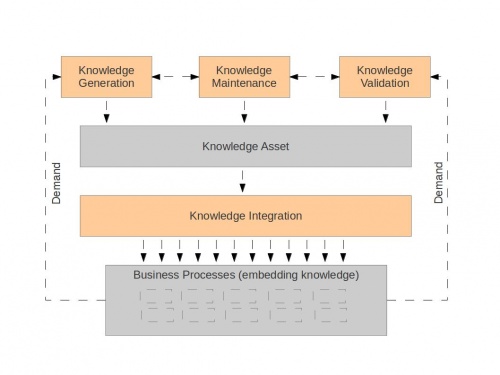Difference between revisions of "Knowledge process"
DeGrosbois (Talk | contribs) (→Definition) |
|||
| Line 12: | Line 12: | ||
==Definition== | ==Definition== | ||
{{PAGENAME}} is {{ {{PAGENAME}} }} | {{PAGENAME}} is {{ {{PAGENAME}} }} | ||
| − | |||
| − | |||
== Summary== | == Summary== | ||
| − | + | A knowledge process is a process, function or activity that acts on or with (i.e. modifies or applies) one or more knowledge elements or assets of organizational knowledge (i.e. either tacit or explicit). Most business and organizational work processes are knowledge-dependent and/or knowledge-driven, and by definition they embed one or more knowledge process. There are several "types" of knowledge process. These are conceptual or working definitions commonly used and represent basic "knowledge process" categories. There is no agreement on knowledge process type definitions in the literature and some overlap or are inconsistent. Each knowledge process (type) is used to represent (collectively) similar or inter-related knowledge processes, functions or activities. This wiki has defined x standard knowledge process types, collectively the "knowledge processes" (or KPs). | |
==Description== | ==Description== | ||
Revision as of 18:22, 16 February 2014
Template:DavidBerahaDefinition
Knowledge process is Knowledge process is a process that acts on /or with knowledge, either individual knowledge or organizational knowledge.
Summary
A knowledge process is a process, function or activity that acts on or with (i.e. modifies or applies) one or more knowledge elements or assets of organizational knowledge (i.e. either tacit or explicit). Most business and organizational work processes are knowledge-dependent and/or knowledge-driven, and by definition they embed one or more knowledge process. There are several "types" of knowledge process. These are conceptual or working definitions commonly used and represent basic "knowledge process" categories. There is no agreement on knowledge process type definitions in the literature and some overlap or are inconsistent. Each knowledge process (type) is used to represent (collectively) similar or inter-related knowledge processes, functions or activities. This wiki has defined x standard knowledge process types, collectively the "knowledge processes" (or KPs).
Description
There are many different descriptions of knowledge processes found in the literature. However, for Nuclear knowledge management purposes the knowledge processes may be structured into nine categories as depicted in fig. 1. The prevalent and most widely used categories are the ones by which knowledge is generated, validated, maintained and integrated in organizations, as depicted in fig. 2.
The table of knowledge processes provides an extensive list of knowledge processes and their categorization.




